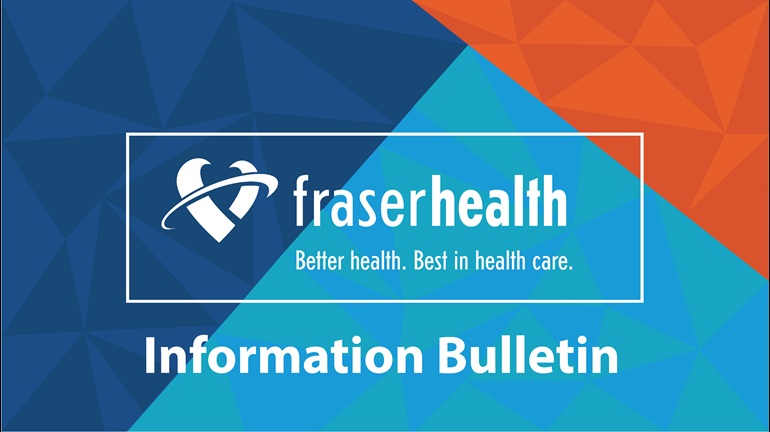
A Heat Warning was issued on August 10 by Environment Canada which advised of increasing temperatures from Thursday, August 12 through to Sunday, August 15.
Medical Health Officers for both Vancouver Coastal Health (VCH) and Fraser Health (FH) are again urging residents to take precautions to protect themselves and those who are vulnerable from the health risks associated with sustained high temperatures.
While forecast temperatures are not anticipated to reach the heat alert levels recorded during the extreme heat event in June, public health urges people to prepare for the weather ahead and to take measures to stay safe. Based on previous heat events, the anticipated temperatures are proven to cause negative health outcomes among Lower Mainland residents who may not be acclimatized to temperatures in this range and may not have ready access to adaptations, such as air conditioning. Heat stress can pose an immediate danger to health. Symptoms of heat-related illness can include thirst, dizziness, confusion, weakness and fainting or collapsing, including loss of consciousness.
High indoor temperatures can be particularly dangerous for older adults and those with chronic health conditions. Medical Health Officers are again strongly advising Lower Mainland residents to take precautions to protect themselves and others. Important steps people can take in the days ahead include:
- Conduct regular checks on vulnerable people- Individuals who live alone, particularly seniors, are at high risk of heat-related illness. Check in regularly to ensure they have no symptoms.
- If you identify signs of illness, assist in moving them to a cooler indoor or shaded space, support them in getting hydrated and seek medical assistance.
- If urgent medical support is required, call 9-1-1 without delay.
- Stay hydrated- Drink cool non-alcoholic beverages (preferably water) irrespective of your activity intake- don't wait until you are thirsty. If your doctor generally limits the amount of fluid you drink or you take water pills, ask about increasing the amount of water you can drink while the weather is hot.
- Keep pets and children cool- Never leave children or pets alone in a parked car. Temperatures can rise to 52°C (125°F) within 20 minutes in an enclosed vehicle when the outside temperature is 34°C (93°F).
- Access air conditioned spaces- Seek out an air-conditioned facility (such as a shopping centre, library, community centre, restaurant, or a residence of friends or family).
- Use public splash pools, water parks or pools or take a cool bath or shower.
- At high temperatures, fans alone are not effective. Applying cool water mist or wet towels prior to sitting in front of a fan is a quick way to cool off.
- Dress for the weather- Wear loose, light-weight clothing. Protect yourself from the sun by wearing a wide-brimmed hat and sunglasses.
- Keep your home cool- Open windows, close shades, use an air conditioner (if you have one) and prepare meals that do not require an oven.
- Avoid sunburn- Stay in the shade or use sunscreen with SPF 15 or more.
- Avoid tiring work or exercise in the heat- If you must exercise or conduct strenuous work, drink two to four glasses of non-alcoholic fluids each hour. Limit day time outdoor activity to early morning and evening time.
- Seeking care- For critical, life-threatening conditions, please call 9-1-1 or go to the nearest emergency department. This includes anyone experiencing difficulty breathing, shortness of breath or chest pain.
- For other non-life-threatening matters, there are a number of options to seek care during the summer. Urgent and Primary Care Centres (UPCCs) are open evenings and weekend, seven days a week and provide care for unexpected, non-life threatening health concerns that require treatment within 48 hours.
- If you are unsure where to seek care, please call 8-1-1 or your family physician.
Get Informed
- Visit VCH.ca or fraserhealth.ca/sunsafety for more information about the health impacts of heat.
- For more information on heat-related illness, call HealthLink BC at 811.
- Fraser Health Virtual Care allows you to connect with a health professional. You can call 1-800-314-0999 or use the web chat from 10 a.m. to 10 p.m. seven days a week at fraserhealth.ca/virtualcare
Vancouver Coastal Health is responsible for the delivery of $4.1 billion in community, hospital and long-term care to more than one million people in communities including Richmond, Vancouver, the North Shore, Sunshine Coast, Sea to Sky corridor, Powell River, Bella Bella and Bella Coola. VCH also provides specialized care and services for people throughout B.C., and is the province's hub of health-care education and research.
Fraser Health is responsible for the delivery of hospital and community-based health services to over 1.8 million people in 20 diverse communities from Burnaby to Fraser Canyon on the traditional territories of the Coast Salish and Nlaka’pamux Nations. Our team of nearly 40,000 staff, medical staff and volunteers is dedicated to serving our patients, families and communities to deliver on our vision: Better health, best in health care.
For media inquiries, please contact:
media@fraserhealth.ca
